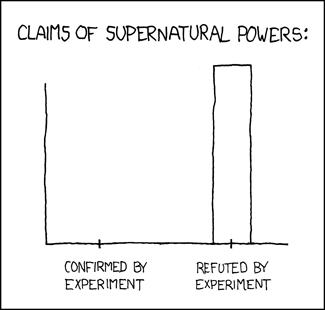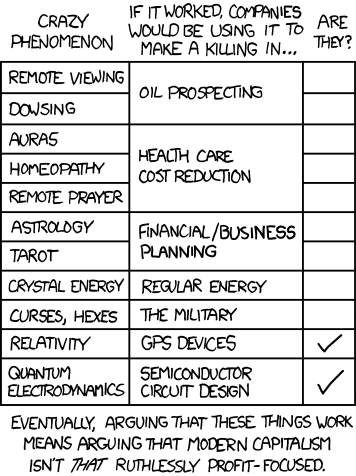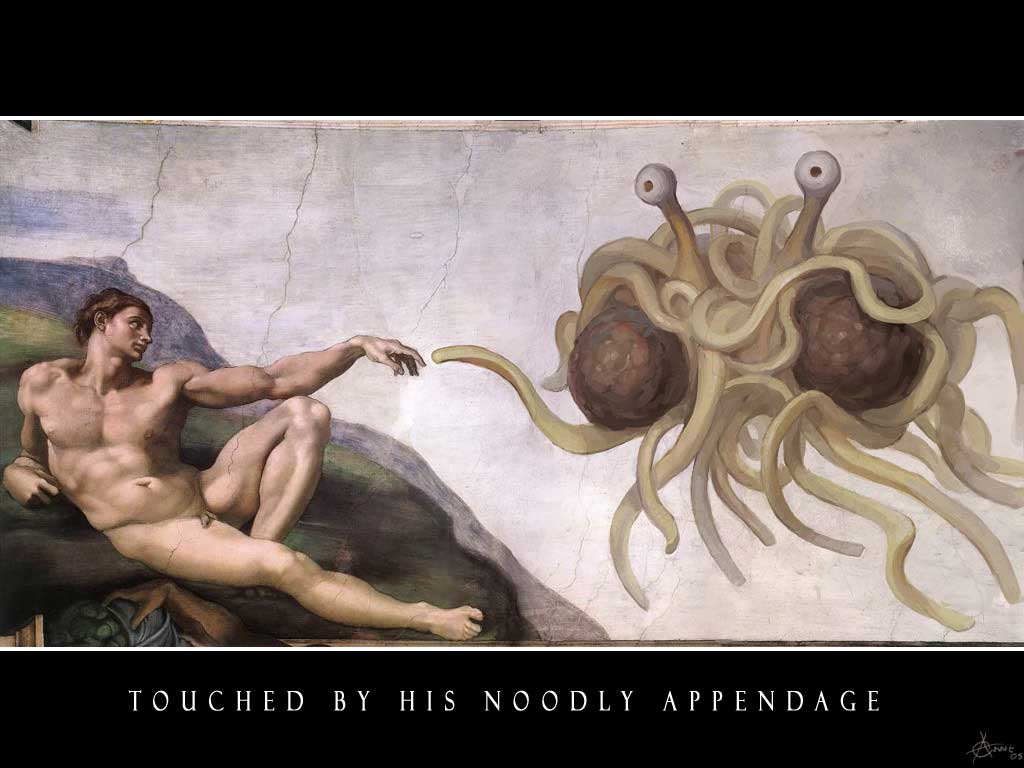
| 
|

| 
|
[M]ost people would sooner die than think; in fact,
they do so.
- Bertrand Russell
Welcome to CPSP119D, section 102*, "Science and Pseudoscience." You will have the chance in this class to develop the skills necessary to avoid becoming "most people"; to prove that you are willing to tackle difficult questions and not always jump for the easy answer.
This colloquium is focused on developing critical thinking skills by debunking (or not!) claims by pseudoscientists, and thereby developing an understanding of what science is and what it can and cannot do. We will also explore the shifting boundaries between (and definitions of) faith, belief, comprehension and the limits of science. We will investigate how logical fallacies play a large role in shaping public opinion of science, pseudoscience and faith. Ultimately, it will be up to the student whether science implicitly has any limits and what he or she wishes to believe in the absence of evidence, or even in the face of counter-evidence. Some of the pseudoscience topics in this course may seem frivolous. We will treat them as straw men to develop the language of informed criticism. By the end of the semester, the student should be able to answer these questions confidently and knowledgeably: |  The incomparable geekfest xkcd
|
In a one-credit, one semester course we can only hope to scrape the surface of the complicated terrain around the philosophy of science, the psychology (and biology!) of belief, the rather surprising limitations of human reasoning, and the very real current dangers confronting humanity because of willful ignorance. We will not have time to delve as deeply as I (and possibly you) would like, and the interested student is encouraged to continue this pursuit outside class. [Side note: SDU alumni have begun an on-campus organization, the UMD Society for Inquiry which may interest you!]
Discussing the differences (and similarities?) amongst science, pseudoscience and religion may be a delicate topic for some, and students are urged to consider the Classroom Rules of behavior when engaged in conversation. Theoretically, at least, there is no cause for offense; practically, some students have been upset or unwilling to continue discussion (including, or especially, atheist students!). There will be people uncomfortable with the kinds of questions that will arise, either because they've never confronted them before, or because they feel unready to deal with them in a public setting. Please speak with me early in the semester (privately during office hours if you prefer) if you want to abstain from these discussions (see the Lecture Schedule).
This is a one-credit course, and there are no exams. Your grade is based on (1) your participation in class, (2) homework assignments, (3) a group project and (4) specific activities outside the classroom. Academic rigor is a hallmark of Scholars, but you will quickly learn that it is not always necessary or relevant to show it through tests. Some questions won't have "correct" answers and the intellectual rigor of wrestling with those will serve you well in all your classes.
 Once again, xkcd
nails it.
It is HIGHLY UNLIKELY that I will have to curve this class and I expect that most of you will do just fine. However, you can "fail" this class (remember that your SDU classes GPA must be 3.0!) if you rarely show up and blow off the assignments; just blowing off the assignments will drop your grade to a C or worse. You will also do poorly if you show up but consistently violate the Classroom Rules spelled out below.
| ||||||||||||||||||||||||||||
Assignments will generally be on the ELMS website where you will also be able to see your grade as the semester progresses.
Back to Top
Even if you do not volunteer information readily, you will almost certainly
be called on in class at some point to give your opinion or to posit an
argument. Later in the term, there will be staged debates! Consider this
to be practice for your required participation in the end-of-term group
project where you will be expected to contribute your fair share of the work.
Each assignment usually has some "short-answer" questions (very simple if
you've done the reading). There will also be a topic-specific question or two
requiring longer (multi-paragraph) answers, or the occasional calculation.
There won't always be "right" or "wrong" answers for the longer questions,
but I expect you to present (where asked) answers which reflect some personal
critical thinking backed up with references when needed. Although discussion
with your classmates is encouraged, final work must be in your own words!
(See Academic Integrity below.)
I will dock points if your answers are particularly poorly written (contain
egregious grammar and/or spelling errors; lack citations where needed, etc.).
Also, multiple pages should be stapled together or you will lose points.
These assignments will be on ELMS. Work must be turned in on the duedate (that's what a
deadline means).
One fourth of the project grade will be given for an annotated bibliography
and outline which will be due about one month into the semester. Another
fourth will be based on draft of the paper, due in early April. I will
comment on those drafts and they will undergo some
peer review. One fourth of the grade will be on the final paper and one fourth
on the final presentation. See Lecture
Schedule for due dates as they evolve.
Scholars is a living/learning program. As part of building the academic
community of SDU, you are expected to attend (and reflect on) experiences
beyond the colloquium classroom. In particular, there are four
"extra-curricular" items we require.
Academic Showcase: Scholars puts on a huge affair near the end of
the semester where nearly all the sophomores display posters of what they did
for their capstone projects. We require you to visit so that you can see
firsthand
Student Interview: While we are not your official academic
advisors, we require that you make an appointment to see one of our four SDU
staff members in the SDU office within the first few weeks of class (just as
we did in the fall). Sign ups will be outside the SDU office door. Talk to Dr.
Romani or myself during lecture if you cannot make any of the scheduled office
hours.
We will discuss how last semester went for you, your collegiate goals,
interests outside SDU, your participation in SDU this year and next. We'll
also listen to your concerns and try to answer any of your questions about
Scholars, SDU and Maryland.
Excursion: You are encouraged to attend any and all
excursions this semester, but you
are required to attend at least one. We usually have five or six to
choose from, including some we leave to the Student Advisory Board to plan.
Reflection Essay: You will write a reflection essay due on the
last day of class which bears on your experience with Scholars and/or SDU this
year. On the header above, you'll see a link for "Reflection Essay Prompts"
which includes guided questions to make this a meaningful exercise for you and
for us. We take these very seriously as feedback on what is working well with
SDU and Scholars and what is not and how you are adapting and thriving within
SDU. If you feel strongly critical, please phrase your criticism in a
constructive way, i.e., suggest ways we can improve. You will be held
accountable for poor grammar and spelling, but an active first person voice
is completely acceptable here ("I enjoyed...", etc.).
Back to Top
Course Expectations
 Participation (30%):
In order to contribute to, and get
something out of, this course, I expect you to try to attend all of our
colloquia. (In particular, DO NOT MISS the last two colloquia
where you all will be presenting group projects or your project grade will
definitely drop.) If you cannot attend due to illness, please contact me
before 4 pm of the colloquium day or you will not get credit! There is
rarely an excuse for not being able to at least call me and leave a message.
For the record, the official University policy on how to deal with absences is
here.
Participation (30%):
In order to contribute to, and get
something out of, this course, I expect you to try to attend all of our
colloquia. (In particular, DO NOT MISS the last two colloquia
where you all will be presenting group projects or your project grade will
definitely drop.) If you cannot attend due to illness, please contact me
before 4 pm of the colloquium day or you will not get credit! There is
rarely an excuse for not being able to at least call me and leave a message.
For the record, the official University policy on how to deal with absences is
here.

Classroom Rules
Please note that consistent violations of these rules will result in a very
poor grade in this class (C or worse which is a "fail" by SDU standards).

Is this an ad hominem attack?
|
Extra Credit?There will be no extra credit. Disability AccommodationStudents with a documented disability who require academic accommodations should contact me as soon as possible. If you suspect you might require such in this class or any, please feel free to discuss this with me during office hours, or head straight to the Disability Service Support office for more information. |
| ||
Academic IntegrityThe University of Maryland, College Park has a nationally recognized Code of Academic Integrity, administered by the Student Honor Council. This Code sets standards for academic integrity at Maryland for all undergraduate and graduate students. As a student you are responsible for upholding these standards for this course. It is very important for you to be aware of the definitions and consequences of cheating, fabrication, facilitation, and plagiarism. For more information on the Code of Academic Integrity or the Student Honor Council, please visit http://www.shc.umd.edu/ or go straight to the source.Back to Top
Back to Top
Students who complete evaluations for all of their courses in the previous semester (excluding summer), can access the posted results via Testudo's CourseEvalUM Reporting link for any course on campus that has at least a 70% response rate. You can find more information, including periodic updates, at the IRPA course evaluation website. The expectation is that all students will complete these. This is YOUR chance to anonymously evaluate this class: please use this opportunity! I have altered courses before based on constructive criticism from students. | |||
*The two sections (101 and 102) of the Freshman colloquium (CPSP11xD where x=8 for Fall and 9 for Spring) are required for the College Park Scholars "Science, Discovery and the Universe" (SDU) program. They can be taken in either order (Fall then Spring or vice versa) and cover two different aspects of the program.